Technology and economic development
This entry will help you understand how advances in technology and land acquisition developed Auckland's economy but greatly impacted Māori and their economy.
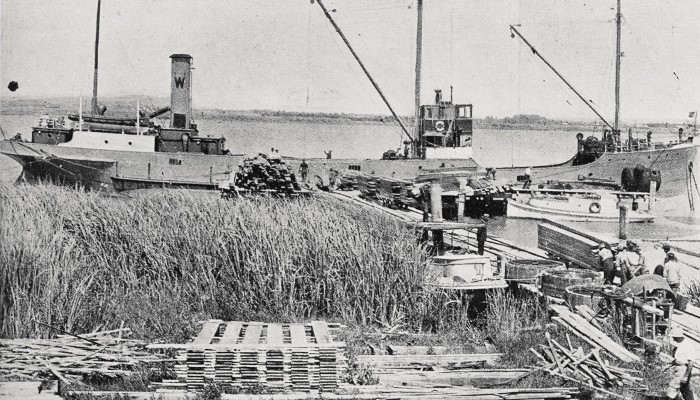
Images: A New Zealand timber for export to Australia by J M Henderson. Collection: Auckland Libraries Heritage Collections AWNS-19330308-46-01.
Keywords
Here is a list of some keywords based on the advances in technology and economic development of Tāmaki Makaurau, and its impact on Māori. Use this list when searching the collections and websites in this entry.
Boat building: Boats and ships became popular as people and goods needed to be moved along the coast of New Zealand, and exported overseas. Ketches, schooners and small steamships were some of the sailing vessels built.
Building bridges: Constructed from wood, stone or concrete, bridges were important because of the hilly regions and rivers in Aotearoa. The Auckland Harbour Bridge and Grafton Bridge are examples of bridges in Tāmaki Makaurau.
Export: The ports of Auckland on the Waitematā and Manukau Harbour are important centres of trade for Aotearoa. From the 1870s, gold, kauri timber and kauri gum were the main exports.
Flour mills: Built around the 1840s to turn wheat into flour, the mills were made from wood or scoria rock and operated by hand, wind or water.
Meat and dairy factories: This led to the export of butter, cheese, milk powder, sheep meat and beef. They are still some of Aotearoa's major exports today.
Māori land loss: The sale of Māori land and land confiscation laws passed by the colonial government led to the loss of land for Māori.
Pottery: Crown Lynn pottery was a popular household name in the 1960s. Tableware, jugs and a range of bathroom products were examples of articles made from clay.
Railways: The first railway between Auckland to Onehunga was built in 1863. Railways became important to connect Auckland with the rest of the country.
Refrigeration: This is the process of freezing food or drink to preserve it. Refrigeration made the export of meat, butter and cheese a profitable industry.
Sawmills: These are factories where trees and logs are cut into pieces by hand or machine. Auckland's timber industry was one of the main sources of employment in Auckland around 1885.
Sugar factory: A sugar refinery is where raw sugar from cane or beet is extracted and processed into sugar. Chelsea Sugar Factory was built in 1884 in Birkenhead on Auckland's North Shore.
Tips: Before searching it can be useful to come up with a list of words to use. These are sometimes called keywords or search words. They can be the name of a person, place, or event you are researching. You can leave out small words like ‘the’ and ‘of’ and just choose the main ones, eg 'timber industry'. We can always change our keywords or add more if we need to.
Tips: Also keep in mind that there are different names or spellings for words. Or they could have changed over time.
Auckland resources
Here are some collections from Auckland Libraries and other reliable Auckland based museums and heritage websites. They will help you find books and information on advances in technology, economic growth, and its impact on Māori and Tāmaki Makaurau.
Auckland Libraries Catalogue
This catalogue from Auckland Libraries will help find books on Aotearoa New Zealand and Auckland's histories.
Search the catalogue using keywords like ‘economic history Auckland’ or ' economic history Aotearoa New Zealand’ or 'Auckland Māori economy'.
You can get fewer results by using the filters under Refine by.
Select a book that interests you.
Go down the page to Edition information to check if the book can be borrowed or if it’s for In library use only.
Look down the page to Related Resources to find other titles related to this search.
If you have an Auckland Libraries card, you can also request the item be sent to your local library.
Tips: You will find lots of books that have been written over 50 years ago. While they are good sources of information, we need to remember the context and time from when they were written.
Auckland Libraries Research Centre
Collections from the Research Centres include heritage collections and research books on the history of West Auckland, Māori and Pacific titles, family and local history, New Zealand war history, migrant and minority history and more. Most of the books are for in-library use.
Select a Research Centre to check on their opening hours and location.
Speak to a librarian if you need help.
Tips: If the status of the book is 'In library use only', it means the book can only be used in the library and can't be taken home. In this case you will need to fill out a form or speak to a librarian about reading the book in the library.
Heritage et AL
The Heritage et AL blog is written by librarians and is a useful way to find information about Auckland Libraries heritage collections.
Enter the words 'sea cables' in the search box at the top of the page.
Read the article The many lives of E. Mervyn Taylor’s mural Te Ika-a-Maui about the connection between Maui fishing up the North Island and the laying of the Commonwealth Pacific Cable (COMPAC) in 1961.
Use the search words 'Maori land loss' to find the article Resilience: The Auckland Māori Community Centre.
This article is about the spread of urbanisation in Auckland and its impact on Ngāti Whātua Ōrākei.
Tips: Blogs can be good for looking at how things have continued or changed over time. Remember, stories can be told in different ways so it’s helpful to look at multiple information sources to find different perspectives.
Kura — Oral History
Find collections of oral history interviews, collection series, recorded talks and events.
Enter the words 'sugar factory' to find Angela Black, talk on the Chelsea Sugar Refinery, 2022.
Use 'flour mills' to listen to Lisa Truttman, talk on the Epsom windmill, the first flour mill built in Auckland in 1844.
Not all of the oral histories are available online, so fill up the form that comes with the oral history item you want to listen to or watch, then select Submit form. The library will get in touch with you when they have the item ready for you to use.
Tips: Primary sources like oral histories are useful for hearing first-hand accounts, and gathering information about people’s values, attitudes and experiences about a topic or event from that time. Keep in mind that they may not fairly show a wide range of views or experiences.
Auckland Libraries - YouTube
The Auckland Libraries YouTube channel has many videos about Auckland’s heritage, recordings of library events, conversations with authors, talks, stories, activities, music and more. Some of the talks are delivered by historians on their specialist subjects.
Go down the page to Ngako: The Collection Talk and find the video called Extraction and Conservation on Rangitoto about the honey industry linked to the largest Pōhutukawa forest in the world.
Under Heritage Talks, find the video From Rail to Roads and Rubber Tyres with Samuel Turner O’Keeffe. This talk is about the changes in transport from rail to road in Tāmaki Makaurau.
Tips: Historical sources such as newspapers, diaries, articles, artworks, videos, and interviews etc can be useful for finding different perspectives on a topic. Keep in mind that they may not fairly show a wide range of views or experiences.
Kura — Photographs
Browse photographs, illustrations and works of art from the 1800s to the present day.
Use the search words 'kauri logging' to find the image of Four men felling a Kauri, Waitākere Ranges.
In the same way, try other keywords like 'railways', 'bridge building', 'refrigerated shipping' or any other from the list of keywords above.
Tips: Always remember to check the copyright or usage rights of images. This will tell you if you need permission to use the image, and how to attribute the image.
Kura — Local History
This is a collection of local history essays, including Dalmatian Genealogical & Historical Society resources.
Look for Collection Name from the filters on the left, then select local history essays to read The railway renewed: 150 years of Railways in Manukau.
You will also find in this collection the image of The gathering and sale of kauri gum in South Auckland.
Items that cannot be viewed online, come with an online form. Fill out the form to contact Auckland Libraries if you want to view an item.
Tips: Make sure to read the 'Usage Rights' or check with Auckland Libraries for the use of these items as copyright rules may apply.
AHI Auckland History Initiative
AHI is a project from the University of Auckland that supports and promotes the histories of Tāmaki Makarau.
Search for 'Auckland Harbour bridge'.
Look down the page for "A Dream of the Very Distant Future": Early Visions of a Bridge across the Waitematā.
This story is about the first plans in 1860 to build the Auckland Harbour Bridge to its opening in 1959.
Tips: We like sites like this because they’re reliable. You can tell because of their web address – they have either .govt or .ac, meaning they are from government or educational organisations. They’re also New Zealand sites, so relevant for us.
MOTAT (Museum of Transport and Technology)
Based in Auckland, this is New Zealand’s largest transport and technology museum. Visitors can explore and discover the achievements that have helped shape New Zealand’s history.
Go to the tab Collection & Stories to select Collections Online.
Look down the page to Topics, then select View all topic.
Select the story MOTAT's Barclay 1270 about a locomotive used to carry logs to sawmills, and timber to the New Zealand Railway line at Putāruru.
You will also find The Arrival of a MOTAT Icon, a New Zealand designed and constructed steam train built in 1932 at the Hutt Workshops of New Zealand Railways, Wellington.
If you look further down the page you will see images of other trains.
Tips: Some websites have .au, .nz, .uk or other codes in their url. This can tell you which country this website comes from eg .au is from Australia or .nz is from New Zealand. You can check the ‘About Us’ link on the website for more information.
Tāmaki Paenga Hira | Auckland War Memorial Museum
This is one of New Zealand's significant heritage libraries. It has pictorial and art, Māori and Pacific, natural, social, and history collections. It is a great place to visit and check out exhibitions and galleries about topics involving Aotearoa New Zealand's histories.
Use the tab called Discover to select Stories.
Next, select Collections Stories.
Use the drop-down menu from the tab called Browse section to find South Auckland real estate plans and Heritage Auckland newspapers.
These stories are an overview of the sale of sections of land in Papatoetoe and the newspaper publishing business in colonial Auckland.
You can also use the search bar at the top of the page to enter the words 'Auckland airport' to read the story Documenting the new Auckland International Airport.
Tips: Websites that have .com or .co in the address can have good information, but you need to assess how reliable it is. Check the About us link on the website, if you can find one. That can tell you what the company’s mission and values are.
Remuera Heritage
Remuera Heritage was established in 2007 to recognise, protect, and preserve Remuera's natural and cultural heritage.
The tab called Exhibitions leads to lots of stories about Remuera's past.
Select the story on the Remuera Railway Station.
This is about the station built in 1907 as a stop on the Auckland-Onehunga railway route. The station is a reminder of the early role played by New Zealand's railway system in transport and trade.
Tips: Local heritage sites are a great way of learning about the local history and culture of a particular area as they have stories that connect the past with the present.
General New Zealand resources
The websites below belong to government agencies, national museums, archives, libraries and other reliable sources. They will help you find information on the history of Tamaki Makaurau, what helped to develop its early economy and what were some of the challenges faced.
Te Ara: The Encyclopedia of New Zealand
Te Ara is an excellent starting point for all questions about Aotearoa New Zealand. If we look down to the bottom of the page, we can see that the website belongs to the Ministry for Culture & Heritage, so the information is well-researched and reliable.
Go to Stories A-Z.
Explore Auckland region to read stories about timber towns and the expansion of Tāmaki Makaurau.
Explore Auckland places to read about the role of the Waitematā Harbour, Auckland's central business district and the industrial heartland of south-east suburbs in Auckland's economy.
NZ History
NZ History is another great website for information about Aotearoa New Zealand. The website belongs to the Ministry for Culture & Heritage, so the information is well-researched and reliable.
Look under Culture and Society to find the topic Transport.
These stories describe how shipping and railways developed New Zealand's economy over the years.
NZ On Screen
NZ On Screen is a collection of television, film, music videos and web series from the past to today. It is managed by the Digital Media Trust and funded by New Zealand On Air.
Search for the documentary series called Making New Zealand.
Watch the series on forestry, farming, roads, railways and shipping to understand how technology developed these industries and the economy of New Zealand.
NZ Electronic Text Collection
The New Zealand Electronic Text Collection has digitised New Zealand and Pacific Island texts and materials. It can be used by anyone.
Enter the search words 'Auckland flour mills'.
Read City Flour Mills.
This page from The Cyclopedia of New Zealand (Auckland Provincial District) is about Bycroft Limited, the oldest flour-milling industry in Auckland.
Tips: This site uses Google to search, so the results will look like a normal Google search but all the results are from the NZETC.
Heritage New Zealand | Pouhere Taonga
This government agency is responsible for identifying, protecting and preserving heritage places, buildings and sites in Aotearoa New Zealand. You find lots of information and images of important heritage places in Auckland.
Use the tab called Places to select New Zealand Heritage List.
Under Explore The List select Auckland Council, then Show listings.
Look for Auckland Timber Company Building and read about the importance of kauri timber industry.
The entry for Corban's Winery and Mt Lebanon Vineyards is about the winemaking pioneers of Auckland.
Tips: Websites that have .org or .net in the address can have good information, but you need to assess how reliable it is. Check the About us link on the website, if you can find one. That can tell you what the organisation’s mission and values are.
Books
You can also visit your local public library for books on Auckland and Aotearoa New Zealand histories. Listed below are a few titles to help you with your search for books on this topic:
Not in narrow seas: the economic history of Aotearoa New Zealand by B H Easton
Waitakere kauri: a pictorial history of the kauri timber industry in the Waitakere Ranges, west Auckland by John T Diamond and Bruce W Hayward
Making peoples: a history of the New Zealanders from Polynesian settlement to the end of the nineteenth century by James Belich
Paradise reforged: a history of the New Zealanders from the 1880s to the year 2000 by James Belich
The taming of distance: New Zealand's first international telecommunications by Elisabeth Airey
SCIS no: 5496704
More about Auckland
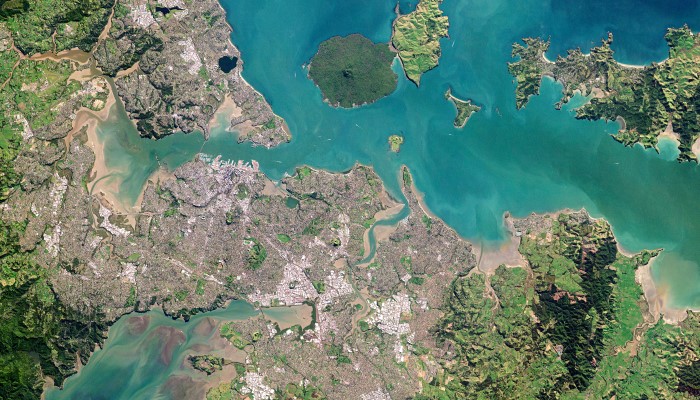
Local iwi
There are many iwi with ancestral relationships to Tāmaki Makaurau. This page lists iwi and websites which have information about their histories.
Learn about local iwi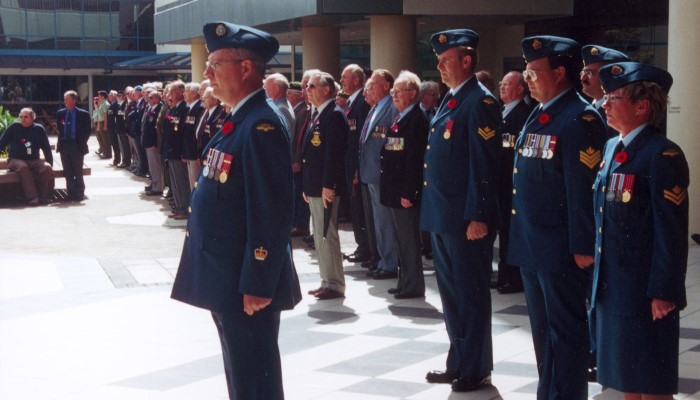
Changing views on conflict
This entry recommends resources to find out how New Zealand's involvement and views of conflict have changed over time, and how wars are commemorated. It also looks at New Zealand's work with the United Nations and current ideas of national identity.
Learn about changing views on conflict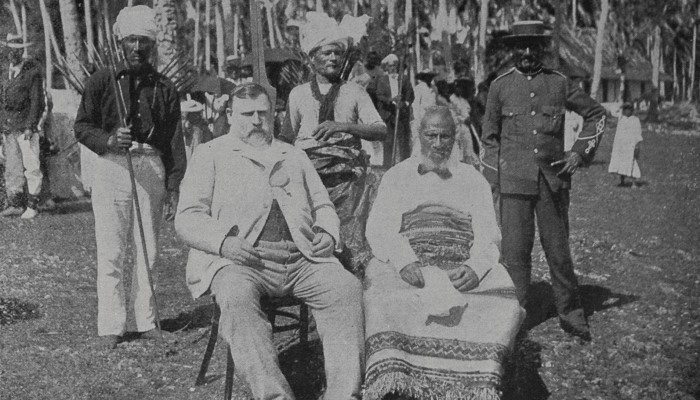
Colonial power in the Pacific
This entry has collections and websites to help explore the history of New Zealand's presence and colonial power in the Pacific. It has examples of the rise of independent Pacific nations and how they sustained their culture and presence in the Pacific.
Learn about colonial power in the Pacific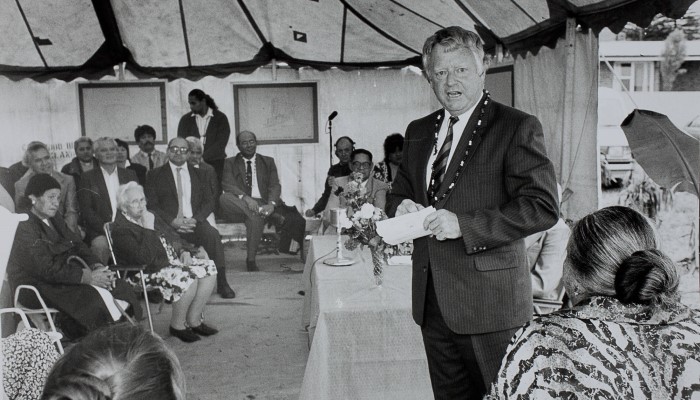
Decolonising the Pacific
This entry will help you find the best websites and collections to explore the decolonisation of the Pacific, including Aotearoa New Zealand's continued interests in the region.
Learn about decolonising the Pacific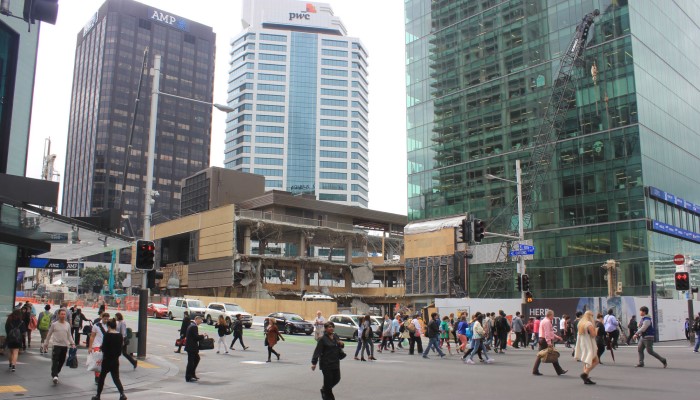
Economic independence and vulnerability
This entry will help you find information about the history behind Auckland's economic progress and independence, and the factors that impacted it.
Learn about economic independence and vulnerability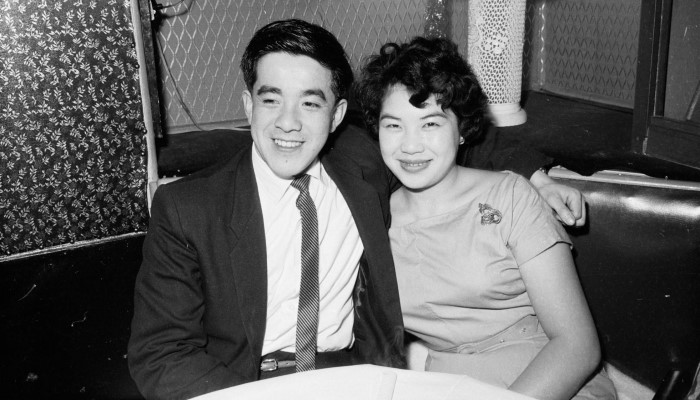
Finding a place in Aotearoa New Zealand
Since the 1700s, new people have immigrated to Aotearoa. Some came in search of a better way of life or because their country was no longer safe. Newcomers could experience racism and discrimination. They also helped shape New Zealand as a country.
Learn about finding a place in Aotearoa New Zealand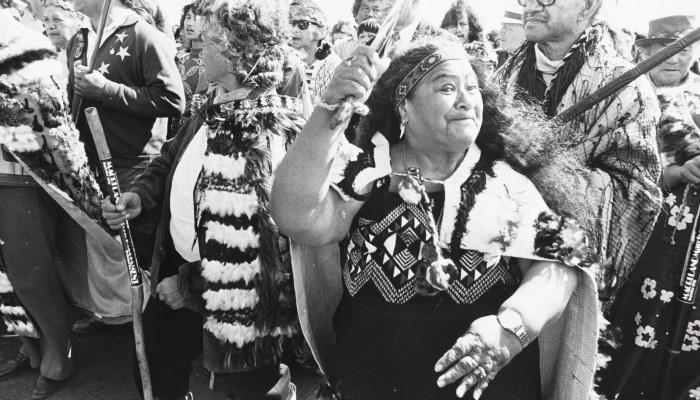
Mana in Māori society
This entry has websites to help you understand the different meanings of mana and its importance in political, social and traditional relationships in Māori society.
Learn about mana in Māori society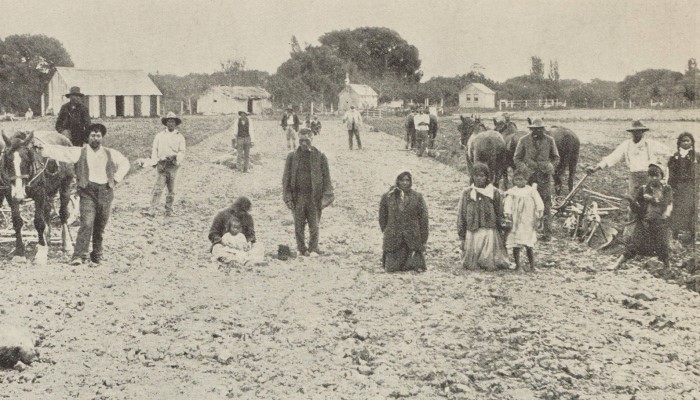
Māori economy: opportunities and challenges
This entry will help you find the best websites and databases that explore the history and development of the Māori economy including the challenges Māori faced from the New Zealand Wars, land sales and decisions made by the Native Land Court.
Learn about māori economy: opportunities and challenges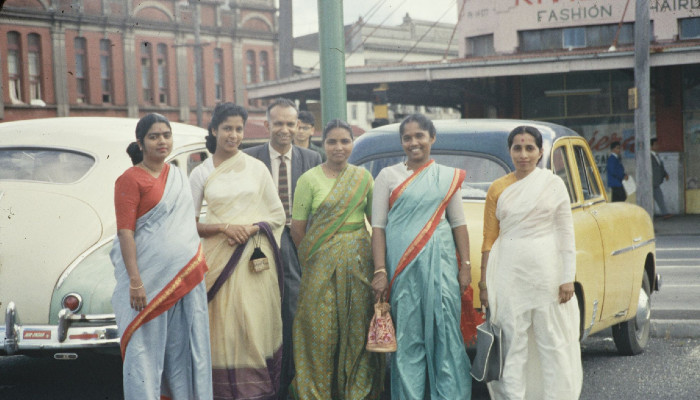
Peopling the colony: inclusion and exclusion
This entry recommends places to find information about the history of immigration to Tāmaki Makaurau and New Zealand. This includes immigration laws and changes, the role of Māori in immigration, and the government's attempt to set right past injustices.
Learn about peopling the colony: inclusion and exclusion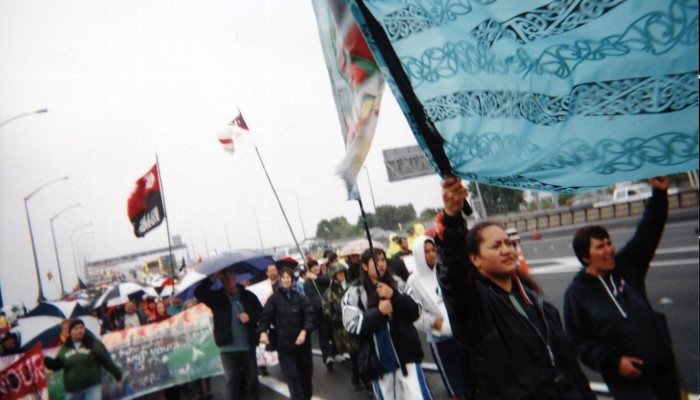
Sovereignty vs rangatiratanga: wars, laws and policies
This entry recommends websites where you can find information about the impacts of land laws on Māori, the New Zealand Wars, and attempts by Māori to find justice and build a relationship with the Crown.
Learn about sovereignty vs rangatiratanga: wars, laws and policies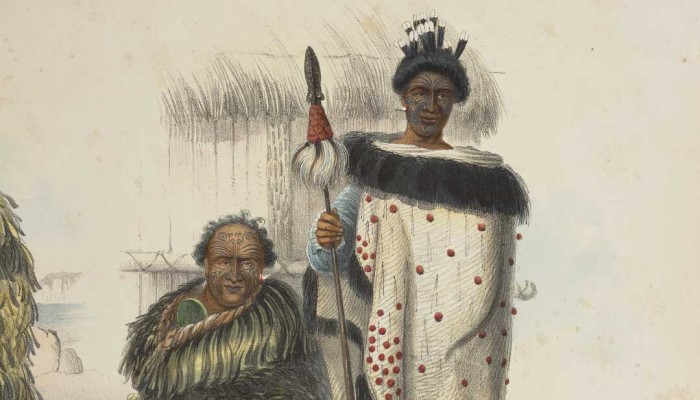
Te Tiriti o Waitangi
This entry recommends websites and collections to find information about He Whakaputanga o te Rangatiratanga o Nu Tireni | The Declaration of Independence and the Treaty of Waitangi | Te Tiriti o Waitangi, their significance, and the signatories.
Learn about te Tiriti o Waitangi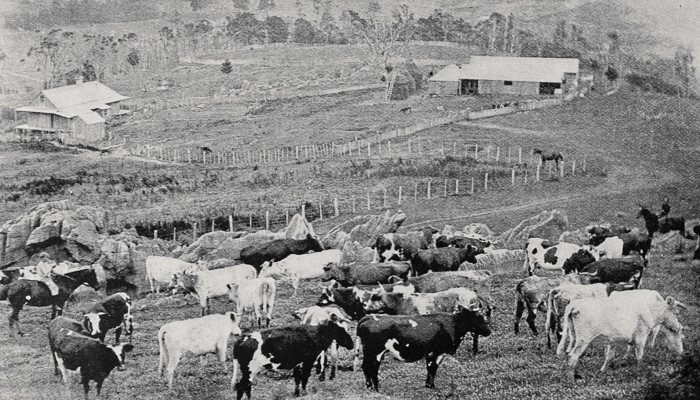
Transforming environments
This entry explores changes made by settlers to Aotearoa's natural environment, their naming of places and features, and efforts to conserve and restore its natural beauty.
Learn about transforming environments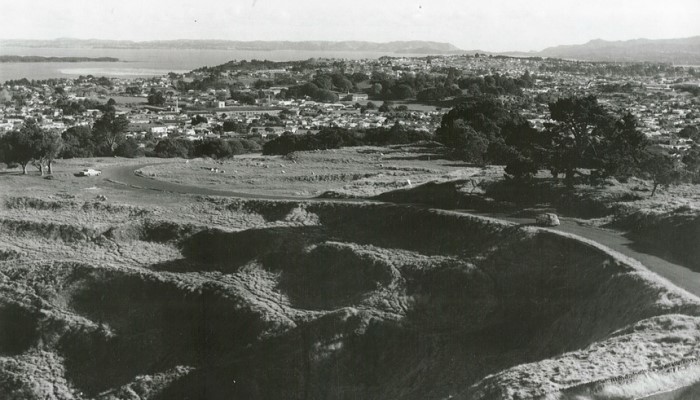
Transforming te taiao
This entry will help you find information on the changes made to the environment by pre-European Māori, and their care and connections to te taiao (the natural world).
Learn about transforming te taiao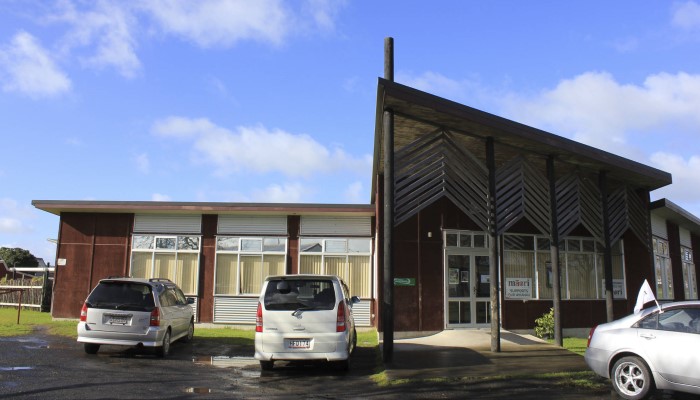
Urbanisation and being Māori
This entry will help you find information about Māori migration to cities, their challenges, and what this meant for their identity as Māori. You will also find information about some protests Māori were involved in to challenge political and social ideas.
Learn about urbanisation and being Māori
